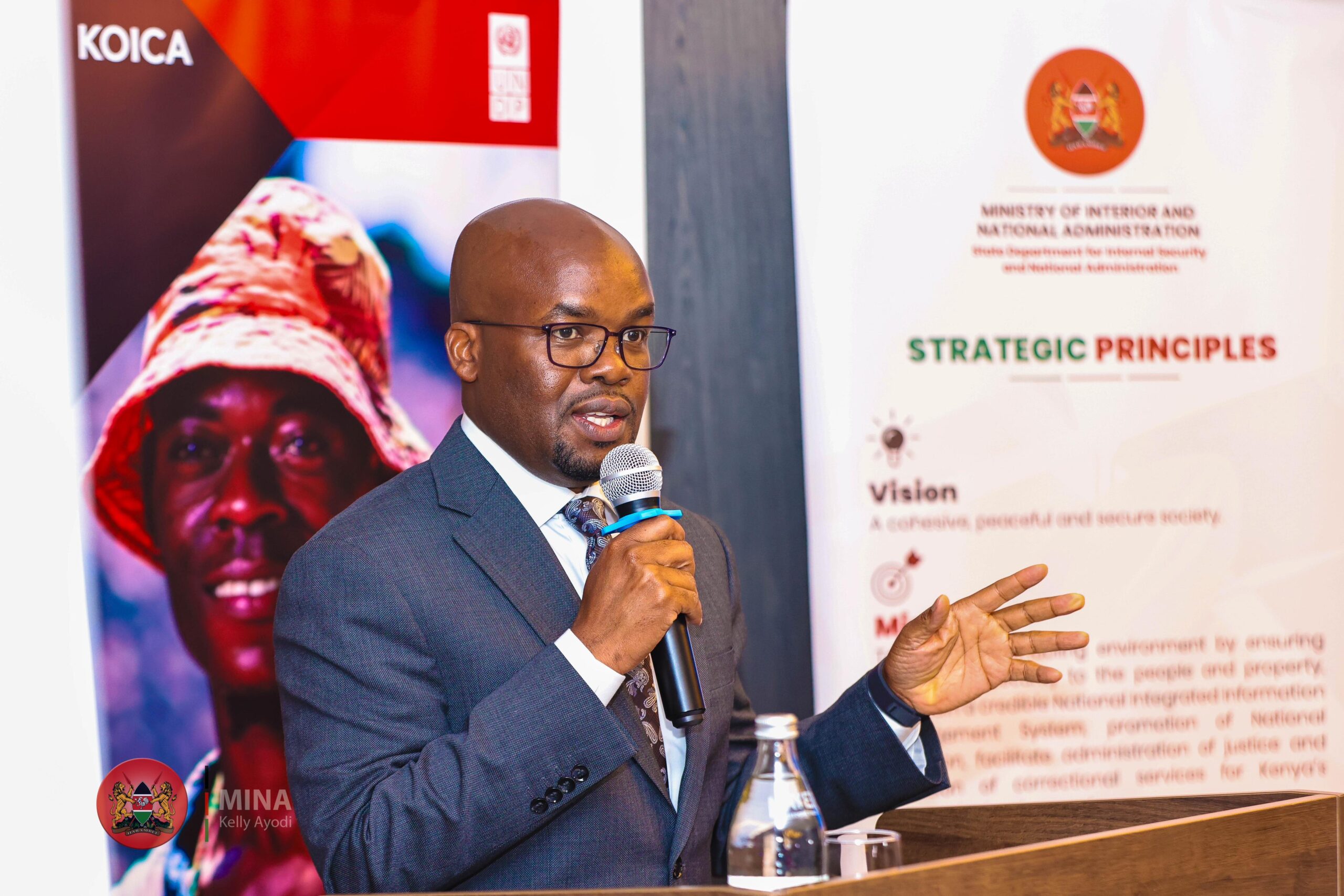
PS Omollo calls for regional efforts to counter violent extremism in East Africa » Capital News
NAIROBI, Kenya, Nov 13—An initiative involving three East African countries aimed at consolidating peace efforts and fighting violent extremism was rolled in Nairobi on Wednesday.
The regional initiative dubbed Regional Programme on Peacebuilding and Preventing Violent Extremism will support peace and security efforts in Kenya and the neighbouring Somalia and South Sudan.
The three-year programme supported by the United Nations Development Programme (UNDP) Kenya and other international partners will prioritise joint efforts involving citizens of the three countries at the grassroots
Speaking during the event at Kwetu, Nairobi, Kenya’s Internal Security nd National Administration principal secretary Raymond omollo said the new programme would consolidate gains made in the region for greater stability and progress.
In Kenya, for example, the new initiative would amplify the country’s efforts being implemented in line with the new policy framework governing peacebuilding and prevention of violent extremism developed last year.
The framework developed by a panel of 13 eminent peace advisors in consultation with stakeholders identifies persistent conflict triggers and strategies on fighting emerging security pressures like violent extremism and youth radicalization.
The advisors were appointed following President William Ruto’s order for a comprehensive evaluation and review of the country’s “peacebuilding architecture”.
“The ministry of Interior and National Administration appointed the 13-member team of distinguished Kenyans to spearhead national dialogue and formulate what we term as the New Agenda for Peace in Kenya, ”Omollo said.
The PS said the new regional effort will identify specific violent extremist risks, including conflicts related to identity and politics, exposure to extremist ideologies and sensationalist coverage through online and media platforms, as well as limited economic opportunities that push individuals towards extremist groups.
The three East African countries will require USD 18 million (about Sh 2.5 billion to implement the regional peace building and security programme for three years.
The event provided an opportunity for participants to take stock of the achievements in management of peace and the fight against violent extremism, assess the challenges encountered and discuss way forward in the region.
PS Omollo stated that while Kenya and the region had made progress in supporting peace building and cohesion efforts as well as forestalling violent extremism, a lot more ground needed to be covered.
Describing the launch a milestone in the region’s partnership aimed at lasting peace and development, Omollo called for concerted efforts to consolidate the gains already made, adding that various countries faced similar security threats and challenges.
He regretted that Kenya had suffered acts of extremism in the past citing terror attacks at Westgate, Mpeketoni, Garissa University and Dusi.
The recent Shakahola tragedy, he said, was a reminder of the persistent threat of religious motivated violence in the nation.
“These acts of extremism have not only led to devastating losses but have also left us in a perpetual state of heightened security and anxiety,” he added.
The PS said competition for natural resources and border disputes, especially in our arid and semi-arid regions had also been a source of extremism.
In the Asal areas, he noted, pre-existing grievances had often been exploited by extremist groups to further their agenda.
The PS, however, said Kenya was relatively peaceful and stable compared to other countries in the east and horn of Africa due to her investment in development and sustainable efforts in conflict resolution.
He lauded efforts of a network of more than 500 community-driven peace committees in Kenya, which integrated traditional dispute resolution mechanisms.
The committees comprising elders, women, youth, and inter-faith leaders worked in various parts of the country to complement formal peace programmes.
The Interior PS called on managers of security in the continent to prioritise community participation in peace efforts to attain sustainable stability and progress.
He urged participants to lead efforts aimed at strengthening national legal and institutional frameworks, enhancing border controls, and promote regional cooperation.
The PS said effective implementation of measured agreed upon at the conference also required sustained political adequate resources, and enhanced international assistance.
PS Omollo said there was need to collaborate with various State agencies dealing with violent extremism for effective implementation of the regional blue print.
He thanked the UNDP Kenya resident representative Anthony Ngororano and partners for supporting the conference.
About The Author